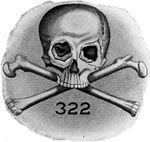EtcEtc : Facts from the early life of Bush, Blair, Hu Jintao, Musharraf - stranger than fiction!
I did some research on the childhood/youth of some of the most powerful men in the world today. It turned out to be a very illuminating exercise. One might call it pop psychology, but reading through the early life events of these leaders gives one new insights into their personalities and also makes us realize, as to why they have turned out to be, the men they are today.
We chose some nuggets...
George Bush (nicknamed 'The Lip' - when he attended Yale, because of his outspokenness):
- Was an alcoholic who gave up drinking after a particularly bad hangover.
- Was member of the ultra-secretive 'Skulls & Bones' society in Yale (see the society's logo,on the left), like his father before him. The society often dines using a set of Hitler's silverware, has initiation ceremonies with gory rituals and members are expected to talk about their sexual experiences in front of all members, at length. Who else has been member of ‘Skulls and Bones’?” Presidents, Cabinet officers, Spies, Supreme Court justices, Captains of industry, and often their sons and lately their daughters, a social and political network like no other" according to a story done by none other than CBS News. Bonesmen are also encouraged to think that they are 'special' and different than the 'barbarians' in the outside world. Does this sound familiar to Bush's foreign policy theme ?
Know more about 'Skulls and Bones' society at: http://en.wikipedia.org/wiki/Skull_and_Bones.
- Is a dyslexic. You can't hold his attention for more than 5-10 minutes. Dyslexics are known to have short attention spans and think more in pictures than in letters, numbers, and symbols. They are known to have difficulty during schooling and are often categorized dullards, when in fact dyslexics have been proven to have a keen intuition, creative skills and multi-dimensional thinking. They are usually good at math and analytical thinking. George Bush's favorite subject was Math and "English was difficult".
Tony Blair (Nickname in school- 'Emily'- you would know why if you had heard his "caring, sharing" speeches earlier in his Prime ministerial stint):
- Was popular amongst his classmates in college but "all his teachers" disliked him according to John Rentoul , Blair's biographer and "were glad to see his backsides".
- Tony Blair is the only Prime Minister, since Britain became a pre-dominantly a Protestant nation, to be so close to Roman Catholic beliefs (his wife is a roman catholic). This might sound petty, but is unprecedented and highly unsual in a country like Britain. His policies and actions have a deep imprint of Catholic beliefs (regard for family life and children and some say, perhaps uncharitably on his joining the war on terror, against what is pre-dominantly terrorism inspired from Islamic quarters of the world).
- His Father's and Mother's death early on in his life had a deep impact on him and he has said that it gave his life a sense of "urgency and mortality". He went on to become a "man in a hurry" and pushed the Labour Party towards reforms and eventually, electoral victory, after many many years of Tory rule. Of course he also managed to drag a reluctant Britain into the war against Iraq.
Hu Jintao (Nickname - you got to be kidding or raving mad for even hoping to know...) :
- His father, Ju Jingzhi was tortured and killed for an offence which Hu Jintao himself is guilty of today. Jingzhi was accused of 'capitalist transgressions'. The exact nature of the 'transgressions' is still not clear but according to John Tkacik who is a research fellow on
Pervez Musharraf (Nickname- 'Busharraf' for his closeness to Bush, on the streets of Pakistan):
- Was so traumatized when as a young Pakistan army officer India defeated Pakistan in the 1971 Bangladesh war, that he "literally wept", as he himself admitted in an interview to ‘The Tribune’. He has admitted that this incident was very "important" in his life and guided his future actions. (Musharraf went on to become the prime mover behind the attacking 'Kargil' on becoming Army Chief and many believe that had it not been for 9/11 attacks which forced the U.S.A to tackle state sponsored terror by Pakistan in India, and its support to the Taliban, Musharraf would have continued down a slippery path towards a full scale covert war with India).

